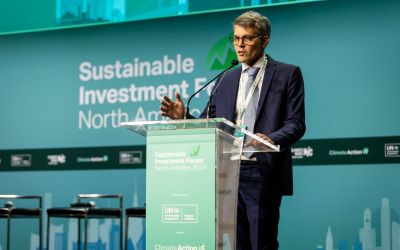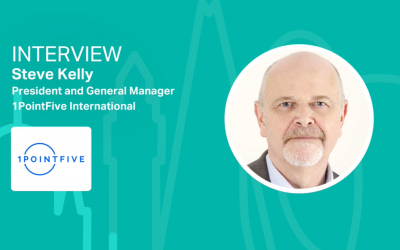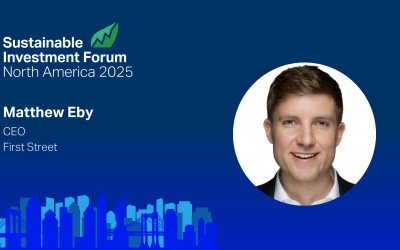Interview with Davida Herzl, CEO and Co-Founder, Aclima
Climate Action caught up with Davida Herzl, CEO and Co-Founder, Aclima, ahead of the Sustainable Innovation Forum, organised on 13-14 November 2017 alongside COP23.

Climate Action caught up with Davida Herzl, CEO and Co-Founder, Aclima, ahead of the Sustainable Innovation Forum, organised on 13-14 November 2017 alongside COP23.
Do you want to introduce Aclima?
Aclima delivers environmental intelligence through sensor networks to improve human health and planetary health. We combine leading-edge sensing technology, cloud computing, and artificial intelligence to take the real-time pulse of the invisible world around us. Translating real-time data into actionable insights, Aclima transforms how we understand and manage our buildings, cities, and industries to create a more resilient, healthy, and thriving world.
What is ‘environmental intelligence’ and how is it related to sustainability and climate change?
Ubiquitous, real-time environmental sensor networks fused with artificial intelligence hold the key to unlocking a new, more balanced relationship with our natural capital. Aclima’s networks deliver continuous, environmental data – for air pollutants that affect human health and climate change. Harnessing the power of big data allows us to develop a new paradigm of decision-making about our immediate surroundings and our effect on the environment.
Aclima networks make the “invisible, visible” and help stakeholders understand, manage, and optimize environmental conditions driving health and well-being. This enables Aclima to contribute unique insights to pressing challenges, including air pollution and hyperlocal climate emissions.
You recently partnered with Google to measure pollution levels by equipping Street View vehicles with Aclima’s mobile sensing platform. What are your aspirations about this collaboration?
In 2015, Aclima collaborated with Google Earth Outreach and the Environmental Defense Fund (EDF) to conduct a year-long research campaign to measure hyperlocal air pollution in Oakland, CA. Earlier this summer, the results of that research were published in the peer-reviewed journal, Environmental Science & Technology. High-Resolution Air Pollution Mapping with Google Street View Cars: Exploiting Big Data shows that air pollution is hyperlocal, varying block by-black across cities.
The research effort was part of a 2015 Clinton Global Initiative commitment to map metropolitan areas in California to explore and better understand applications and use cases across science, health and urban planning. The focus of Oakland was to enable breakthrough research to understand urban pollution at a block-by-block resolution. The work also served to demonstrate the value of hyperlocal mobile measurement to complement regional measurements from the U.S. Environmental Protection Agency’s stationary network.
We're just beginning to understand what's possible with this hyperlocal information and, we’re excited to start sharing some of our findings for the three California regions we drove: the San Francisco Bay Area, Los Angeles, and California’s Central Valley (the Street View cars drove 100,000 miles, over the course of 4,000 hours to collect this data!)
Air pollution is getting more and more attention with local and national governments taking increasing action. How can Aclima help?
You can’t manage what you don’t measure. Today, we are increasingly suffering from multiple global health crises, and resource inefficiencies due to the lack of timely and relevant information about real world environmental performance. In the face of increasing pressures on our environment, we need high-resolution geographic and temporal information to effectively manage the health of our most valuable resources—our air, climate, and water.
Data provides a valuable foundation to create a shared understanding of challenges to help build coalitions to implement solutions. Stakeholders at a global, regional, and national level need to be coordinated in action to prevent disease and support policy. Most of the world is still lacking adequate air monitoring. Through technology like Aclima, it is possible to measure on-the-ground progress and provide a new layer of environmental intelligence that didn’t previously exist. Through data, we can scale what’s working, and adjust what’s not. We can empower a global dialogue, distributed action, and build planetary resilience together.
Aclima is sponsoring the 8TH Sustainable Innovation Forum. What was your main motivation to get involved?
Last year, the WHO identified air pollution as one of the most significant global health epidemics of our time. 92% of the world’s population now breathes unhealthy air –– increasing mortality, respiratory disease like asthma, heart disease, cancer and even basic productivity and cognitive function.
The next five years are a critical window for action in cities around the world to combat the interrelated human health effects of local air pollution and planetary effects of climate change. To address a global problem like climate change, adaptation will require local action in our cities and communities, which feed into larger, country-level climate goals.
There is no silver bullet to combat climate change, it requires a systems-based, collaborative approach that engages countries, cities, companies, and citizens alike. We’re excited to support the Sustainable Innovation Forum which helps foster an important dialogue between public and private stakeholders to advance human health and planetary health.
Join Davida Herzl, CEO and Co-Founder, Aclima at the Sustainable Innovation Forum by registering here






